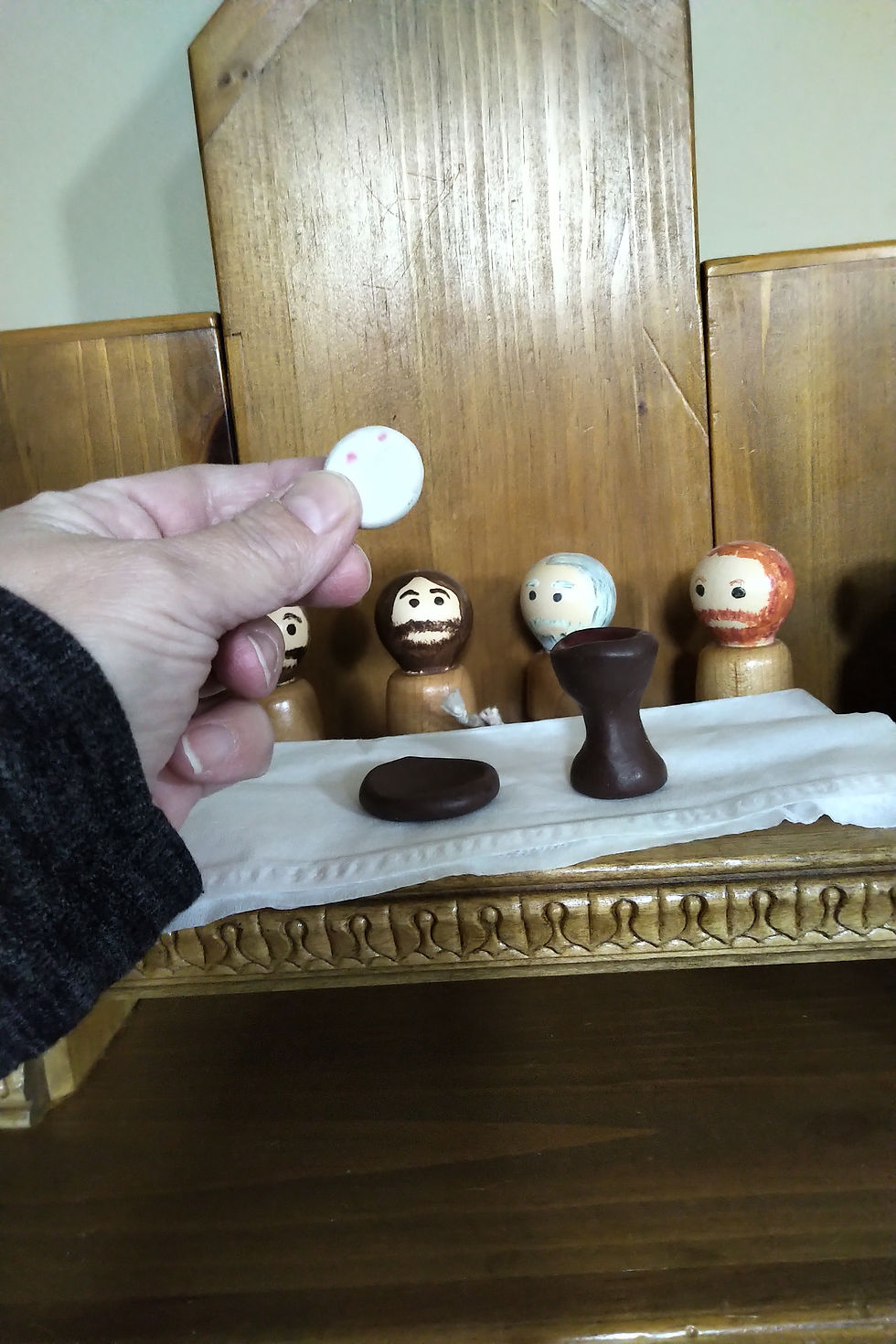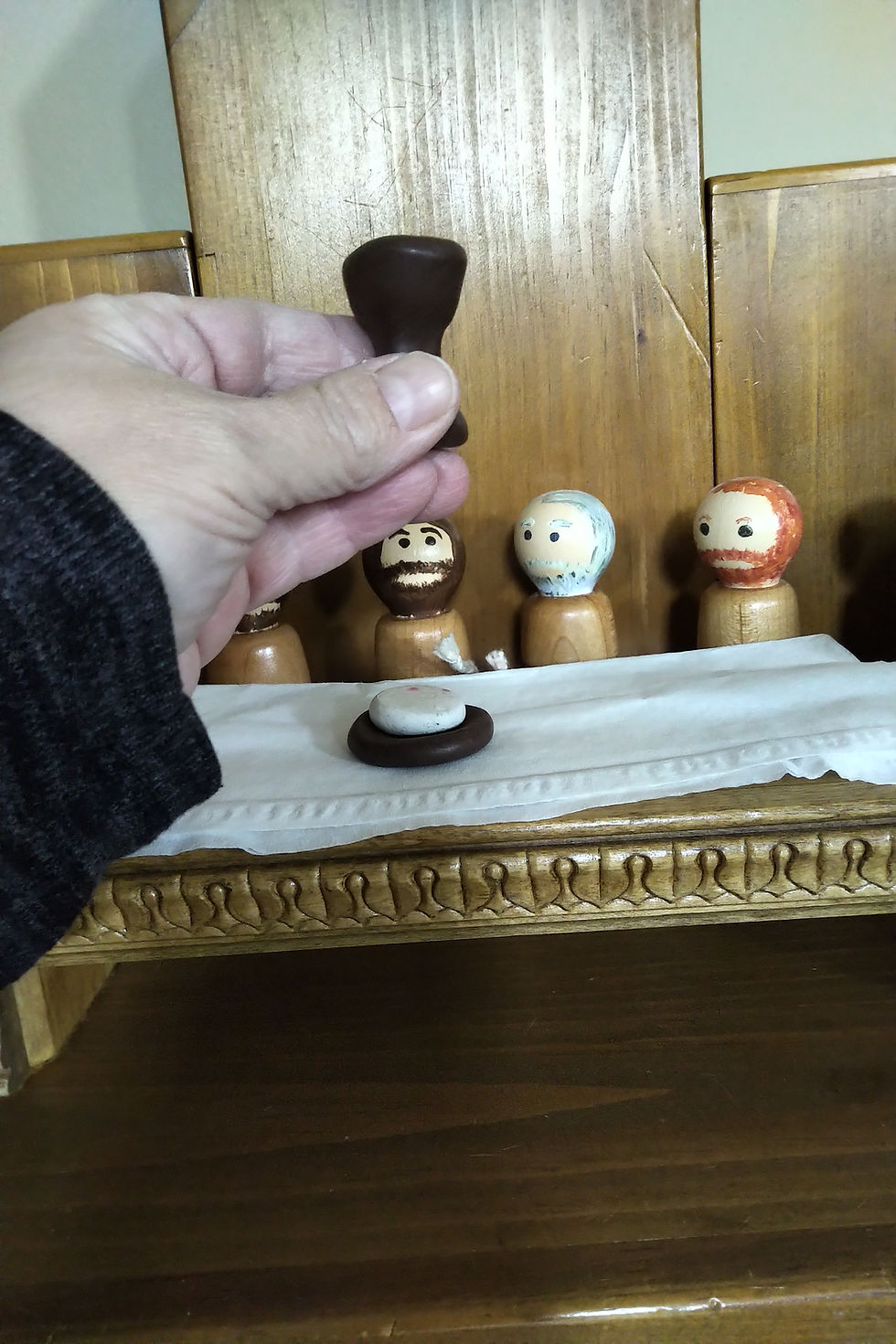Passion (Palm) Sunday (Ages 3-6): Family Forever
- thebetterpart
- Apr 9, 2022
- 3 min read
Luke 22:14, 19-20
(full reading: Luke 22.14 - 23.56)
(Adults, the VERY abbreviated reading is for the 3-6 year old. The full reading is for your reference only.)
This Sunday marks the beginning of Holy Week. It is the most holy week of the whole year. The Church takes a whole week to think closely about one event: Jesus dying and rising to new life, never to die again. We think about this event all the time. It is the Good News! But why is it the Good News? It is a mystery, and we can think about it in this way:
When the hour came, Jesus took his place at the table, and the apostles with him.
What hour is this? What is St. Luke talking about? It is the hour to celebrate the Passover meal. The Jewish people, families and friends, celebrate this meal together in their homes every single year. Jesus celebrates the Passover, too. Here he celebrates it with his friends in the city of Jerusalem.
Every year for over three THOUSAND years, the Jewish people celebrate the Passover meal in exactly the same way. They eat the same foods, they say the same prayers, they ask the same questions, they sing the same hymns—every single year.
But—
the last time Jesus celebrates the Passover with his friends in Jerusalem,
he does something new. He does something for the FIRST time.
Jesus says words that have never been spoken before.

Then he took a loaf of bread, and when he had given thanks, he broke it and gave it to them, saying, “This is my body, which is given for you. Do this in remembrance of me.”
"This is my body..." Are those words new? We have heard these words before. Where do we hear them?
We have heard these words before, but Jesus' friends hear them for the very first time when he shares the Passover meal with them. Jesus says the bread is his body, and he gives it to his friends. Jesus gives them his whole self.
In the bread.

And he did the same with the cup after supper, saying, “This cup that is poured out for you is the new covenant in my blood.
The cup is filled with wine, but after Jesus thanks God for it and gives it to his friends, he says that the wine is his blood. Can we live without our blood? Of course not. Jesus gives them his life.
In the wine.
Jesus gives everything he has—his body and his life—in the bread and the wine. He makes it a gift for his friends and he calls this the new covenant. What does this mean?
A covenant is a special kind of friendship. The Good Shepherd has a covenant friendship with the sheep. He says,
The Good Shepherd calls his own sheep by name and leads them out. When he has brought out all his own, he goes ahead of them, and the sheep follow him because they know his voice. (John 10:3b-4)
The Good Shepherd calls. The sheep follow. They have a covenant friendship.
But there is something the sheep do not know.
A covenant friendship makes them family.
A covenant friendship lasts forever.
Jesus also says,
I am the Good Shepherd. The Good Shepherd lays down his life for the sheep. (John 10:11)
The Good Shepherd gives his life for the sheep.
They are family.
He gives his life to them forever.

When Jesus says those words and gives his friends the bread and the wine, he gives them his life. He says it is a new covenant. Does this make them family? Does this last forever?
We hear these words—does this make us his family, too?

After Jesus says these words for the very first time, he is taken away from his friends. He dies on the cross, and on the third day, God fills Jesus with new life, abundant life, Risen life. Life that lasts forever. Is this life just for Jesus?

Nope. Jesus makes a covenant. He has made us his family. He will be with his family forever.
This is the Good News. Actually, it is the best news ever.
It is something for us to remember during this most Holy Week when adults talk about the death of Jesus and forget to say, "and he is risen to new life, never to die again!"
Because we know, don't we?
We know Jesus is Risen.
We know about the covenant.
We know we are his family forever.
Best. News. Ever.










Comments